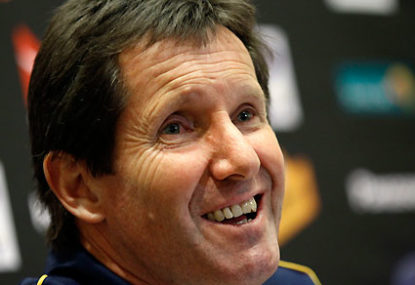Since taking the helm of the Qantas Wallabies, Robbie Deans has made several mistakes. In hindsight, many of these were avoidable.
He must not make the same mistakes this time around.
I am a very big Robbie Deans fan. Equally, I expected more than he delivered in his first four years.
LESSON 1: Culture, culture and culture
Upon Robbie Deans appointment, John O’Neill pointed out that culture was one of the critical issues that the new coach would need to address.
When Deans came on board in in 2008 he underestimated the club’s existing appalling culture, which had been allowed to fester and grow prior to his arrival.
This culture resulted in a multitude of sloppy performances that were best seen in the capitulation against the England team in the 2007 Rugby World Cup.
Deans arrived. The fans gave him time to configure the team personnel and tactics in his likeness.
The fans loved him through four years of frustration.
Remember back to the incredible ways the team found to lose and disappoint the fans.
We blamed player inexperience at the time but, as the years passed, the performances did not mature and the necessary and expected playing style and wins did not materialise in any consistent form.
Do not make the same mistake again. Remember that the four-year cycle comes around very quickly.
Given the record of the past four years, I don’t think that enough has been done on culture. But this must start at the board of Australian Rugby Union and the provinces.
It is the only way that the team will become undefeatable. And it is the only way that the organisation and the Wallabies can return rugby to its position as Australia’s team.
The Wallabies coach, despite the high profile of the position, is not in control of many team management, senior management or board issues.
For Deans to succeed he has no choice, but also nothing to lose, but to demand that the cultural change is implemented throughout the organisation.
Only then can the team really perform to its capacity.
Here’s a case study: an compromising rugby league player of the 1970s retires and takes up coaching. He inherits an also ran team of sixteen year olds from the paddocks of South Sydney.
Before commencing training after the first competition game, he asks two questions of his players:
“Who has been told how well they played?”
Up goes all the hands.
“Who has been told how to play?”
Again, all the hands go up.
“I want you to forget everything you were told!” he replies.
LESSON 2: Hearts and minds
The first and most important element of a coach’s plan is to play with a combination of heart and intelligence. This is an unbeatable combination.
Heart embodies passion, responsibility, pride (in the jersey, the country and its people) determination and ruthlessness.
It must infuse into every component of a team’s preparation every minute of every day, until it is an obsession and a belief.
My definition of intelligent play is that the key players read the game and understand the underlying flow chart that is a rugby game.
The play-makers must be clear about the following things, and must communicate them to their team.
First of all, the objective must be sought. That is, the next play, the next series of plays and the overall game.
Secondly, they must know how to construct a series of plays that will achieve that objective.
Thirdly, they must be familiar with the rigorous implementation and be prepared to adapt as fundamental circumstances change.
With the 1991 Rugby World Cup on the line against Ireland in Dublin, stand-in captain Michael Lynagh gathered the team together and told them what they were going to do to win this game.
In addition, play-makers can’t afford to complicate things.
With the injury toll of modern rugby, and the short attention spans of today’s youth, complicated tactics are doomed to fail.
The Wallabies must be the fittest rugby team in the world.
Every player must understand their job and does it for 80 minutes.
Forwards must deliver quality possession. They must dominate the breakdown intelligently.
The backs, meanwhile, must respect possession and use it with direct, skilful and smart rugby where everyone is involved in every play.
The Wallabies must defend as a unit. They can never give up. But they must also enjoy the experience.
LESSON 3: Patriotism
The opportunity is to bring in the youngsters and present them with a new culture.
That is, a culture of excellence, a culture that reveres the Wallabies jersey and tradition and a responsibility that comes from representing one’s country.
It is an old fashioned concept in these days. It is a foreign concept for today’s generation of players. But, it is still the essential ingredient that makes winning teams.
LESSON 4: Capitalise on existing strengths and opportunities
In Michael Foley, the Wallabies have the best scrum technician in the country, if not the world.
The Waratahs pack demonstrate this every week. The Brumbies and Reds have try-scoring backlines when they have their full complement of players available.
Add the Rebel’s individual stars and Pocock from the Force and this is a squad that could go places.





























































































